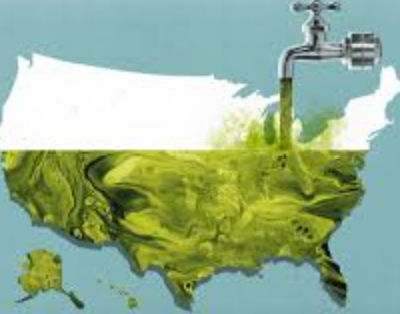Flint Today
Imagine trying to live your normal life without the most basic human necessity—clean, usable water. In the community of Flint, Michigan, they are going through that exact problem. Large amounts of lead, which is incredibly unhealthy to consume, were found in Flint’s tap water in 2014, and the problem remains unresolved.
According to NPR, the crisis began when the state government switched from their previous water system, in which they bought treated water from Detroit, to a new system, taking water from the Flint River in order to save money. However, because the City of Flint rushed to complete the project, they did not properly treat the water. Typical water treatment includes the addition of chemicals like phosphoric acid to the water, in order to prevent corrosion in the pipes and dangerous metals from getting in. Because Flint failed to add this, lead from the pipes leached into the water which citizens used. Many people became sick or more susceptible to illness after using the lead-filled water. No amount of lead in water is safe, and the amount in Flint’s water was noticeably above FDA levels.
Additionally, inadequate chlorine in the Flint pipes allowed iron to leach into them. The iron promoted the growth of bacteria, which led to an outbreak of Legionnaires’ disease. Legionnaires’ spread quickly, becoming the third largest outbreak in the U.S. ever, and the effects were devastating. According to the Michigan Department of Health and Human Services, 87 people were infected with Legionnaires’, and at least 10 of them died.
In response to the crisis, the government provided free water bottles to the people of Flint, but in 2017, the Michigan state government cut off this supply, claiming the tap water is safe to use again. Many people are suspicious, and some have downright refused to use the water since they say it is still unclean. Since the cut-off of the free water bottles, Flint community fundraisers have been set up to raise money to help those in need.
“Flint still doesn’t have clean water!” comedian Michelle Wolf said at the end of White House Correspondents’ Dinner. Also, recently, multi-billionaire Elon Musk has recently tweeted that he will devote himself to helping fix the pipes in Flint.
However, despite these celebrities attempting to bring awareness back to what is happening, Flint has received barely any news coverage in recent months, though dangerous conditions continue.
“I had forgotten about the crisis,” said Cincinnati teen, Eva Wittenberg. Boston teen Thalia Correll said she had only seen “an occasional tweet about it.”
It is important that Flint is covered better in news media because important information continues to come out. If you want to help those affected by the Flint water crisis, you can donate to the Flint Water Fund or other charitable organizations or do your best to spread awareness and help give the people of Flint a voice.




